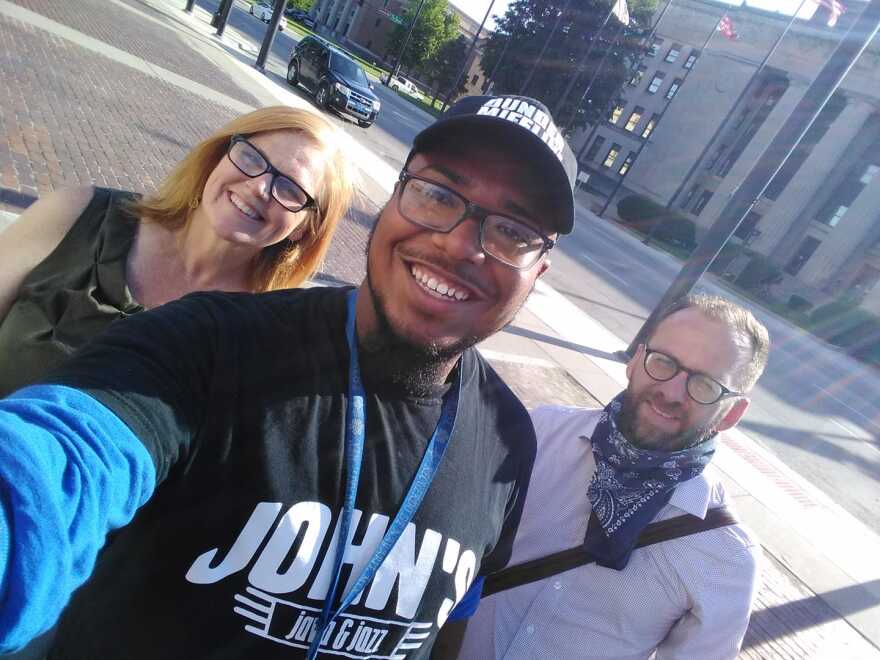After the killing of George Floyd in Minneapolis sparked ongoing Black Lives Matter protests in Kansas City and throughout the world, many white people have wondered how to be better advocates for black people.
Lora McDonald, director of the Kansas City-based social justice organization More2, says she's been hearing that question a lot.
“I haven't ever felt a moment like this before. White people who I've tried to deal with before about race, who said, ‘You're a little too much for me,’ are wanting to get involved and wanting to help.”
Area civil-rights advocates have the following suggestions for white people who want to be better allies.
1. Don't expect your black friends to educate you.
When trying to become educated on what’s happening right now, Justice Gatson of the ACLU of Missouri says it’s important not to place the burden of teaching you on your black friends.
“You're putting that labor back on black people who are already taxed," says Gatson. "The least that you can do is try to figure out some stuff on your own.”
She says asking black friends about current events could make them relive some of their own traumatic experiences. Instead, she recommends reaching out to local civil rights groups who will be in a better position to answer questions.
McDonald says that white people asking their black friends what they can do to help can sometimes come off as tone-deaf.
“Right now to be asking in this moment in time what you can do, when you've known that person all along, obviously you should have been doing things to help already,” says McDonald.
She also suggests getting in touch with organizations like More2, whose purpose is to help others get involved.

2. Make changes in your daily life.
McDonald says one of the first steps to being a better ally is talking about race and what’s happening in the news with your own family. Talking about prejudice frequently is a way to raise children to be educated and not shy away from the issues, she says.
“My son and I have been having ongoing discussions since the time he was born, but I also do things like make sure he knows black business owners and doctors and intentionally expose him,” says McDonald.
McDonald also says there are ways to involve your family in supporting black communities that aren’t protesting.
“There's all kinds of ways to invest time and money in the community. You can just go to black-owned businesses and you can even worship with people of color,” says McDonald.
While protesting is important, McDonald says, even these simple actions can still be impactful and can be done safely at any time.
3. Be active beyond social media.
Online activism has been a key component of the Black Lives Matter movement, but Gatson warns against just being vocal online and not taking any concrete action.
Words are a starting point, she says, but they're not enough to ignite the necessary changes.

“We need allies who are willing to put themselves on the line. We need them to help fight and advocate for policies that will change what's happening,” says Gatson.
One of the best ways to become educated is to get involved in black-led organizations across the city, she says.
“There are groups in Kansas City that help white people to understand what's happening and to know when to act,” says Gaston.
Organizations like the one she founded, Reale Justice Network, or the activist group Showing Up for Racial Justice, Kansas City can help white people become better allies and connect them with resources.
4. Don’t be afraid to make mistakes.
Gatson says one of the reasons people are afraid to get involved is out of fear they will say or do something wrong and offend the community.
She says people need to understand that learning to become an advocate doesn’t happen instantaneously and that’s why organizations like hers are in place.
“This is a growth for people. They come in this and they learn along the way. We help our white brothers and sisters so that they don't make mistakes,” says Gatson.
By following the guidance of the black people who lead these organizations, Gatson says, it will be easier for allies to make sure they are doing the right thing.
McDonald says the fear of making mistakes shouldn’t hold anyone back from getting involved in activism. Even in her career of activism, she says she's had to apologize for actions others have found offensive.
“We have to keep showing up and doing the hard work. Feeling guilty or being ashamed because you made a mistake is nothing compared to being on the receiving end of racism,” she notes.
After apologizing, McDonald says, it’s important to stay willing to have a dialogue with those you may have offended and learn from your mistakes so you can be better informed moving forward.
Justice Gatson and Lora McDonald spoke with KCUR on a recent edition of Up to Date. Listen to the full conversation here.







